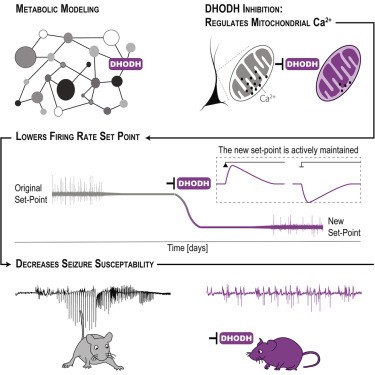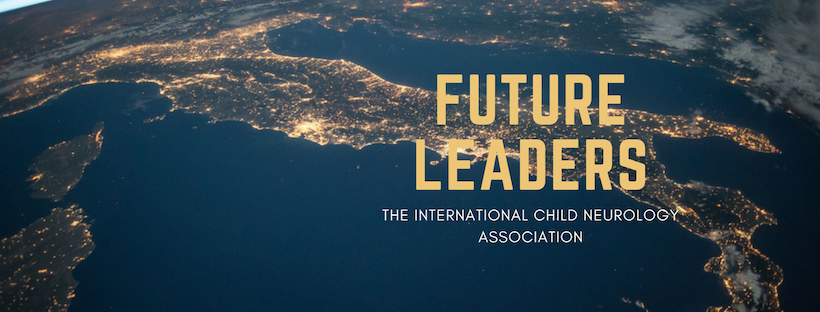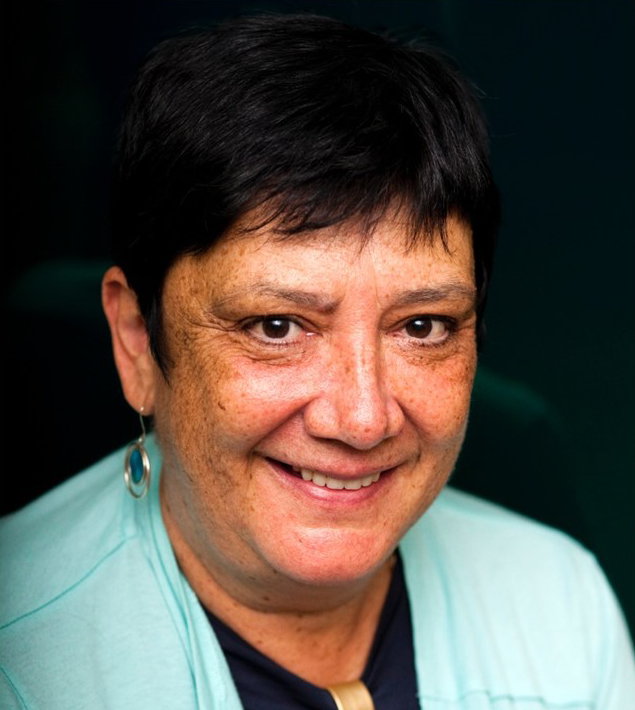
- Details
- ICNA
- News
- Hits: 1212
According to a new study published on April 29 in Neuron, Tel Aviv University researchers identify a homeostatic mechanism that maintains activity set points in neural circuits which ensures the return to a set point after each event that increases or decreases brain activity. The research has raised potential implications for development of drugs to manage a range of neurological and neurodegenerative conditions including epilepsy.
Research for the study was conducted by TAU PhD students Boaz Styr and Daniel Zarhin from Prof. Slutsky's team and PhD student Nir Gonen under the joint supervision of Prof. Slutsky and Prof. Eytan Ruppin of the National Institutes of Health. Prof. Slutsky and her team also collaborated with the laboratories of Prof. Tamar Geiger of TAU's Sackler Faculty of Medicine, Dr. Moran Rubinstein of TAU's Sackler Faculty of Medicine and Prof. Dori Derdikman of the Technion-Israel Institute of Technology. Antonella Ruggiero, Refaela Atsmon, Neta Gazit, Gabriella Braun, Samuel Frere, Irena Vertkin, Ilana Shapira, Leore Heim and Maxim Katsenelson, all researchers in Prof. Slutsky's lab, also participated in the study.
To characterize these metabolic changes associated with epilepsy, Gonen plugged the genetic information of epilepsy patients gleaned from published databases into a computational metabolic model developed in Prof. Ruppin's lab to identify the genes that transform the epileptic disease metabolic state back to a healthy one.
"The metabolic modeling predicted a mitochondrial gene dihydroorotate dehydrogenase (DHODH) gene. Their data suggest that DHODH inhibition by the drug Teriflunomide, approved for multiple sclerosis treatment due to its immunosuppressive actions in the blood, resulted in a stable inhibition of neuronal activity, without impairing compensatory mechanisms to activity-dependent perturbations."
The computational analysis indicates that DHODH plays a major role in the metabolic condition created by the ketogenic diet -- a fat- and protein-rich, carbohydrate-poor diet, which has been effective in the treatment of epilepsy.
In a series of experiments on healthy brain cells in vitro, Styr found that Teriflunomide significantly inhibited neuronal activity irrespective of its immunosuppressive effects. Moreover leaving the drug in neural networks for several days achieved permanent inhibition without any sign of expected compensation.
The hypothesis was tested by examining the response of neurons to perturbations that increase or decrease neural activity in the presence of Teriflunomide. He found that homeostatic mechanisms are still active under DHODH inhibition, yet are tuned to a new, lower set point indicating DHODH as a true regulator of activity set point.
Zarhin studied the effect of Teriflunomide on two mouse models of epilepsy: an acute model that causes immediate epileptic seizures and a chronic genetic model of Dravet syndrome that causes severe epilepsy in children. Because the oral Teriflunomide poorly penetrates the brain, Zarhin examined the possibility of injecting it directly into the brains of the mice. The findings were highly encouraging: Both models showed a return to normal brain activity, along with a dramatic decrease in the severity of epileptic seizures. Notably, the drug rescued calcium overload in the mitochondria, a hallmark of epilepsy and many neurodegenerative diseases. Modification of Teriflunomide and development of new DHODH inhibitors with improved blood-brain-barrier permeability is urgent for drug-resistant epilepsy patients.
These findings raise the exciting possibility for the development of novel antiepileptic drugs by lowering dysregulated set points. Failure in activity set point regulation may exist in other conditions like for e.g Alzheimer's disease which may open up a new conceptual way to treat memory disorders.
Article
Boaz Styr, Nir Gonen, Daniel Zarhin, Antonella Ruggiero, Refaela Atsmon, Neta Gazit, Gabriella Braun, Samuel Frere, Irena Vertkin, Ilana Shapira, Michal Harel, Leore R. Heim, Maxim Katsenelson, Ohad Rechnitz, Saja Fadila, Dori Derdikman, Moran Rubinstein, Tamar Geiger, Eytan Ruppin, Inna Slutsky. Mitochondrial Regulation of the Hippocampal Firing Rate Set Point and Seizure Susceptibility. Neuron, 2019; DOI: 10.1016/j.neuron.2019.03.045
Read More

- Details
- ICNA
- News
- Hits: 1115
The ICNA Future Leaders Programme was launched at the Amsterdam ICNC in May 2016. The programme constituted a way forward to provide support for child neurology trainees and young child neurologists from across the world. The key objectives of the programme were to support training, promote educational activities and foster research in child neurology.
There was an overwhelming response to call for nominations from members and a Future Leaders of ICNA (FLICNA) committee was selected from eligible members. The next step would see the elections to the chair of the committee. Nominations were invited recently and the elections will commence shortly.
Under the programme senior ICNA members would provide support, guidance and mentorship to trainees and colleagues in their early stages of their career.
This group would predominantly hold “virtual meetings”, communicating via e-mail and skype and coming together at opportunistic meetings which they would be attending routinely e.g. ICNCs. The lead for this working group will be funded to attend the ICNA EB meetings (once a year) to feedback progress and developments in the program.
Nominations to the committee are now closed.
Elections to the Chair of the Committee are currently on. Please visit https://icnapedia.org/flicna to cast your vote
The following candidates have been nominated to stand for Chair of the FLICNA Committee.
AMITH KESHAVE University of Kwazulu, South Africa
AQEELA ALHASHIM , King Fahad Medical City, Saudi Arabia
ARUSHI SAINI PGIMER, INDIA
BOLIVAR QUITO-BETANCOURT Hospital Monte Sinai - Cuenca, Ecuador
ESRA SERDAROĞLU Hacettepe University Children’s Hospital, Turkey
HIROYA NISHIDA Tokyo Metropolitan Institute of Medical Science, Japan
SAMATA SINGHI Johns Hopkins School of Medicine, USA
VANITA SHUKLA ABC PAEDIATRICS, TRINIDAD & TOBAGO
Voting is open until 2019-10-31 16:42:43
Read More
- Details
- Ingrid Tein
- News
- Hits: 1071

It is with the deepest sorrow that I announce our much loved ICNA Executive Board member and highly esteemed friend and colleague, Dr. Linda De Meirleir, passed away Oct. 31, 2018, after a long and courageous battle with illness.
She was born in Antwerp, Belgium, March 13th, 1954 and was happily married to Jacques, with two children, Laura and Ben.
Dr. De Meirleir obtained her medical degree at the Vrije Universiteit Brussels in 1979. She became a specialist in Neuropsychiatry in 1984 and Paediatric Neurology in 1997. From 1984 – 1985 she was a Clinical Fellow in Paediatric Neurology, at the Hospital for Sick Children, University of Toronto, Canada and then received a Foreign Research Fellowship Award from the Hospital for Sick Children Foundation 1985 -1986. She subsequently obtained her Ph.D. in Medical Sciences under the supervision of Professor Brian H. Robinson for her thesis: “Pyruvate dehydrogenase E1-alpha deficiency – a molecular and clinical study” in 1993 after successfully cloning and characterizing the Pyruvate Dehydrogenase E1-alpha subunit.
Linda served as the current Professor and founder and Head of Paediatric Neurology and Metabolic Diseases at the University Hospital of the Free University of Brussels (UZ Brussel, VUB) since 1987. She was a highly energetic and dynamic team builder and spearheaded the development of the multidisciplinary Centers for Developmental Disorders, Metabolic Diseases, Neuromuscular Diseases and a clinic for Learning Disabilities in addition to general Pediatric Neurology, expanding her Division from a staff of two to 40 members. Linda was also Director of the Brussels Neonatal Screening Center from 2012 and Director of Rare diseases UZ Brussel from 2017. She consulted monthly at the Centre Hospitalier de Luxembourg and regularly visited the Neuropediatrics Division in Bucharest, Romania, where she provided expertise in the diagnosis and management of metabolic disorders.
Her main scientific activities involved the intensive investigation of inborn errors of metabolism resulting in congenital lactic acidoses syndromes including the clinical, biochemical and molecular aspects of mitochondrial respiratory chain defects and pyruvate dehydrogenase deficiency and also in lysosomal storage disorders in which she made seminal research discoveries. She held continued research funding from the Research Foundation-Flanders (FWO). In addition, she supervised and nurtured a generation of successful Ph.D. and MSc candidates as well as Pediatric Neurology trainees and fostered and initiated studies in cortical malformations, which was the Ph.D. thesis of Anna Jansen, who has since pursued this as her primary research career.
Linda was highly recognized for her unique expertise in Neurometabolic Diseases at both the national and international level. She was the founder and President of the metabolics.be and a long-time President of the Belgian Society of Pediatric Neurology. Her clinical and research contributions were recognized through being awarded the prestigious international Adam Barsky Mitochondrial Lectureship at the University of Toronto in 2008. She served as a member of several International Working Groups for mucopolysaccharidoses, mitochondrial disorders, urea cycle disorders, and organic acidurias to develop consensus statements and improved standards of care for newborn screening, diagnosis, management and interventional clinical trials in children with these rare disorders. She was an active member of MetabERN (European Reference Network for Hereditary Metabolic Disorders), the SSIEM (The Society for the Study of Inborn Errors of Metabolism), and an International networking member of Medicines for Children Research Network (MCRN) and the European Registry and Network for Intoxication type Metabolic Diseases (E-IMD).
At the international level, she worked from 1998 as a Board member of the European Paediatric Neurology Society (EPNS), served as Editor of the EPNS newsletter from 1999, and was the organizer and Congress Chair of the EPNS bi-annual congress held in Brussels, in September 2013 which was rated to be of the highest scientific calibre. She was elected as an Executive Board member of the International Child Neurology Association (ICNA) (2010-2014) and was subsequently elected as Treasurer of the ICNA (2014-2018). It is notably in her activities with the ICNA that she contributed significantly to the promotion of excellence in clinical care, education and research in neurometabolic disorders throughout the world. This global engagement established her numerous and enduring friendships around the globe whereby colleagues respected her clinical wisdom, kindness, and expertise. Her lectures on metabolic diseases and diagnosis and counseling around case presentations were deeply appreciated in India, China, Mongolia, Brazil, Indonesia, Russia, Estonia, Lithuania, Australia, Romania, Luxembourg, Croatia, Bangladesh, Iran, Egypt, etc.
She generated over 230 scientific publications and authored several book chapters. These included chapters in Inborn Errors of Metabolism; Handbook of Clinical Neurology; Pediatric Neurology; Acquired Brain Injury in the Fetus and Newborn; Physician’s Guide to the Neurology of Hereditary Metabolic Diseases of Children; Encyclopedia of Movement Disorders; Acute Pediatric Neurology; Swaiman's Pediatric Neurology: Principles and Practice; and Current Management in Child Neurology.
Above all, Linda had a great heart and generosity of spirit that touched all of those who knew her and for whom she made the world a brighter place. She was a person of rare integrity, quiet dignity and deep humanity, which was present in all of her actions, with a vibrant creative mind which, when combined with her intense dedication, energy, and advocacy, led to her many successful altruistic endeavors. Linda is recognized internationally for her excellence as a highly gifted and compassionate clinician and inspirational teacher as well as a strong clinician-researcher who has impacted the lives of so many children and their families within Belgium and throughout the world, as well as those of her colleagues and the many trainees she has fostered.
Linda will be remembered as a remarkably courageous, dynamic, no-nonsense multitasker and as a deeply dedicated, caring and beloved colleague, mother, and wife who lived a rich life full of joy, laughter, and love. She was devoted to her family and her friends and an ardent sailor with a true ‘joie de vivre’. A peacekeeper and a passionate unifier. We, and most of all her husband, children, and close friends, are heartbroken in our sorrow over her untimely loss but believe that Linda’s immense contributions to Child Neurology and as a pioneer of Neurometabolic Diseases as well as her loving spirit will live onwards in her legacy.
Ingrid Tein MD
President, The International Child Neurology Association

- Details
- ICNA
- News
- Hits: 1379
Professor Hermann Doose, whose name is entwined with Myoclonic Astatic Epilepsy otherwise known as “Doose Syndrome” passed away on April 23rd, 2018 following a brief illness. He was 90yrs old. Professor Doose was a founding member of the neuropediatric society in Germany.Hermann Doose was born on September 1927 in Lübeck, North Germany. His father was a surgeon and mother a gynaecologist. At the age of 16 he was recruited to the army during the last year of the war. A subsequent injury and admission to hospital resulted in him being the lone survivor of the group.
Doose studied medicine at the Christian-Albrechts-University Kiel and the Albert-Ludwigs-University Freiburg where he studied physiology and pathology and then completed a training in pediatrics at the University of Kiel. From 1975 to 1992, Doose was director of the Clinic for Neuropediatrics in Kiel and at the same time the medical director of the North German Epilepsy Center for Children and Adolescents in Raisdorf near Kiel, which was opened on his initiative in 1972. There he headed an epilepsy research center since 1992.
The first EEG laboratory in Kiel was founded by him and his 1963 professorial thesis was on the “Spectrum of Petit-Mal Epilepsies in Childhood”. Professor Doose was head of the Department of Paediatric Neurology in Kiel, form 1975 until his retirement in 1992. In 1972 he founded the North German Epilepsy Centre. He was a physician of great empathy and until the last weeks before his death he continuously received letters and phone calls from his patients. He was a great teacher and had inspired many young doctors to pursue paediatric neurology and epileptology.
During his career he authored many papers, books and book chapters.He described for the first time several epilepsy forms of childhood and adolescence including juvenile absence epilepsy (1965), myoclonic-astatic epilepsy or Doose syndrome (1970), infantile absence epilepsy (1994) and infantile Grand-Mal epilepsy (1998) now known as Dravet syndrome.
His 1967 first self-published textbook epilepsy in childhood and adolescence was long considered a standard work in German-speaking countries. It was last reissued in 1998 and is continued since 2012 by Bernd Neubauer and Andreas Hahn under the title Doose epilepsy in childhood and adolescence which is now in its 13th edition. In 1973 he co-authored an epilepsy memorandum of the Deutsche Forschungsgemeinschaft and in the 1970s co-published several congressional and conference reports. Following the co-edition of a book on the genetics of epilepsy he worked on an EEG textbook for children and adolescents including an English language edition which was his last work.
Professor Doose was President of the German chapter of the ILAE and the Society of Neuropediatrics and in his career won several prizes including the Michael prize in 1963, the Hans Berger Prize of the German EEG Society (since 1996: German Society for Clinical Neurophysiology and Functional Imaging, DGKN) in 1985, Honorary Membership German Society for Epileptology (DGfE) (1994) and the Otfrid Foerster Medal German Society for Epileptology (DGfE) in 2004. The ILAE named him the “Ambassador for Epilepsy” in 1975 and in 1974 he founded the charity “Hilfe für das anfallskranke Kind [Help for the sick child]” to raise funds for research on childhood epilepsies.
He will be remembered as a great scientist, physician and teacher by his colleagues, patients and friends.
Source: STIFTUNG MICHAEL ; ILAE

- Details
- ICNA
- News
- Hits: 1125
In a new study published in The New England Journal of Medicine the researchers, comparing two doses of Cannabidiol (CBD) to a placebo, reported a 41.9 percent reduction in "drop seizures" in patients taking a 20 mg/kg/d Cannabidiol (CBD) regimen, a 37.2 percent reduction in those on a 10 mg/kg/d Cannabidiol (CBD) regimen, and a 17.2 percent reduction in a group given a placebo.
The phase III trial was led by principal investigator and study first co-author Orrin Devinsky, MD, a professor of neurology, neurosurgery, and psychiatry at NYU School of Medicine and director of NYU Langone's Comprehensive Epilepsy Center.
The study included an investigational liquid, oral formulation of CBD called Epidiolex. The product is manufactured by GW Pharmaceuticals, which operates in the U.S. as Greenwich Biosciences; GW Pharmaceuticals funded the clinical trial.
The investigators enrolled 225 patients (age 2 to 55) with Lennox-Gastaut syndrome across 30 international sites in a randomized, double-blind, placebo-controlled trial to assess the efficacy and safety of two doses of CBD: Seventy-six patients received 20 mg/kg/d CBD, 73 received 10 mg/kg/d CBD, and 76 were given a placebo. All medications were divided into two doses per day for 14 weeks. The number of seizures were monitored beginning four weeks prior to the study for baseline assessment, then tracked throughout the 14-week study period and afterwards for a four-week safety check.
Side effects occurred in 94 per of patients in the 20 mg CBD group, 84 percent in the 10 mg CBD group, and 72 percent of those taking placebo. Side effects were generally reported as mild or moderate in severity and those that occurred in more than 10 percent of patients included: sleepiness, decreased appetite, diarrhea, upper respiratory infection, fever, vomiting, nasopharyngitis, and status epilepticus. Fourteen patients taking CBD experienced dose-related, elevated liver enzymes that were reversible. Seven participants from the CBD group withdrew from the trial due to side effects compared to one participant in the placebo group.
A previous study led by Dr. Devinsky published in last May's New England Journal of Medicine had shown a 39 percent drop in seizure frequency in patients with Dravet syndrome. Those findings represented the first large-scale, randomized clinical trial for the compound. Open label CBD studies led by Dr. Devinsky also have shown positive results for treatment-resistant epilepsies.
In April, a U.S. Food and Drug Administration advisory panel unanimously voted to recommend approval of a new drug application for Epidiolex cannabidiol oral solution. The FDA will decide whether to approve the medication in late June.
However Dr Devinsky points out that more research remains imperative to better determine the effects of CBD and other similar cannabis-derived compounds on other forms of the disease and in more dosing regimens.
Citation: Devinsky O, Patel AD, Cross JH, Villanueva V, Wirrell EC, Privitera M et al. (2018) Effect of Cannabidiol on Drop Seizures in the Lennox-Gastaut Syndrome. N Engl J Med 378 (20):1888-1897. DOI: 10.1056/NEJMoa1714631 PMID: 29768152.
Dr. Devinsky received research funding from GW Pharmaceuticals, but no salary support outside of a one-time consulting fee for participating in the FDA advisory panel. He holds equity interests in Pairnomix, Receptor Life Sciences Rx, Tilray, Rettco and Tevard.
Source: NYU Langone Health / NYU School of Medicine Press Release
Read More